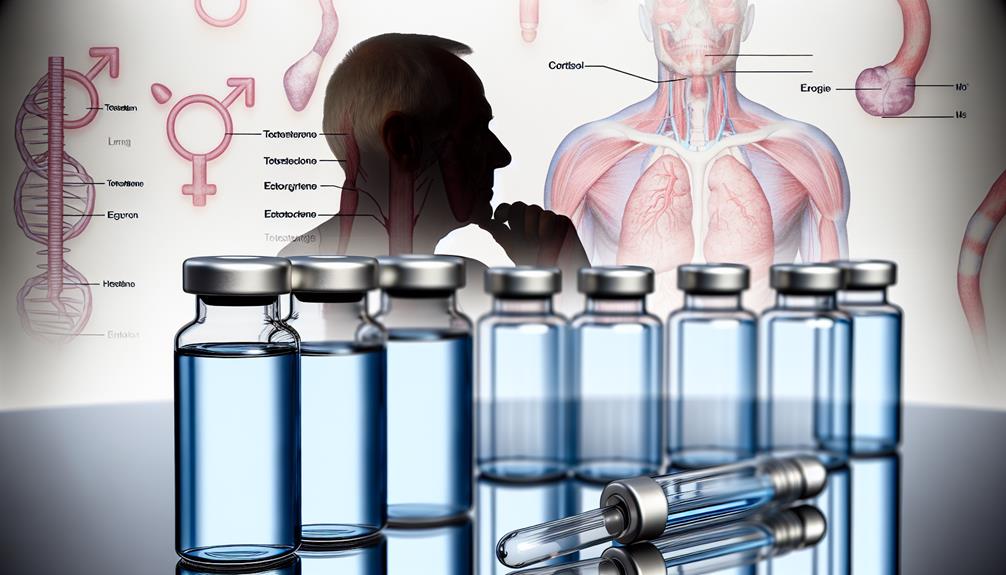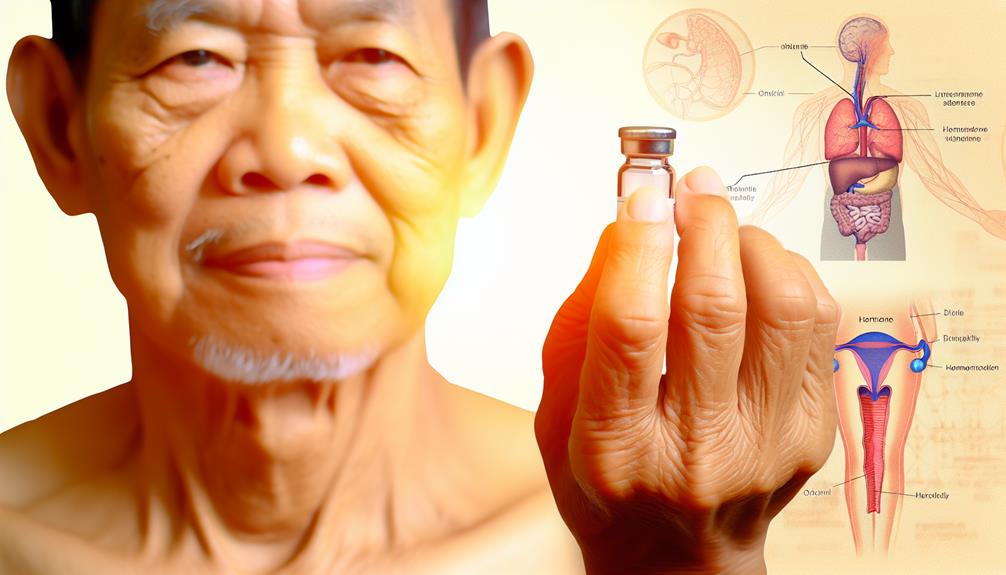As men age, I observe significant shifts in hormone levels, particularly testosterone, which begins to decline around age 30. This drop can impact physical attributes, like muscle mass and fat distribution, and emotional well-being, often leading to mood disturbances or increased anxiety. Studies suggest that lower testosterone is linked to cognitive challenges as well. It's essential for me to manage these changes through regular exercise, a balanced diet, and stress reduction techniques. To understand how to navigate these challenges effectively, there's much more to contemplate regarding lifestyle adjustments and professional guidance.
Overview of Hormones in Men

Hormones play an essential role in regulating numerous physiological processes in men, impacting everything from mood to metabolism. The endocrine system, a complex network of glands, is responsible for the production and regulation of these hormones. Testosterone, the most well-known male hormone, is critical for developing male characteristics, supporting muscle mass, and influencing mood. However, it's not the only hormone that matters. Others, like cortisol, insulin, and thyroid hormones, also considerably contribute to overall health.
Maintaining hormonal balance is essential for ideal functioning of the body. When one hormone is out of sync, it can lead to a cascade of effects that disrupts homeostasis. For instance, elevated cortisol levels, often due to chronic stress, can lead to increased fat accumulation and muscle breakdown, while low testosterone can result in fatigue and decreased libido. These imbalances can stem from various factors, including lifestyle choices, diet, and environmental influences.
As I explore deeper into the complexities of men's hormones, it's essential to recognize that the interplay between these hormones can be intricate. For example, insulin resistance can impact testosterone production, highlighting how interconnected the endocrine system is. Understanding these dynamics is crucial, especially as we age. A thorough grasp of how hormonal levels fluctuate over time can help men make informed decisions about their health and well-being. Therefore, exploring these hormonal effects not only enhances our understanding but also underscores the importance of maintaining hormonal balance throughout life.
Testosterone and Aging
As I examine the relationship between testosterone and aging, it's clear that testosterone levels tend to decline gradually in men, typically starting in their late 30s. This decline not only affects physical characteristics but also has significant implications for overall health, including mood, energy levels, and metabolic function. Understanding these patterns is essential for developing effective interventions to mitigate the adverse effects associated with low testosterone.
Testosterone Decline Patterns
Typically, testosterone levels exhibit a gradual decline as men age, a phenomenon often referred to as andropause. Research shows that testosterone fluctuations can occur, with levels decreasing by approximately 1% per year after the age of 30. This decline isn't uniform; age-related differences can lead to significant variability among individuals. Some men may experience a relatively stable level of testosterone well into their 50s, while others might see marked reductions in their 40s.
This pattern of decline is influenced by various factors, including lifestyle, health status, and genetic predisposition. For instance, men with obesity or chronic illnesses often face more pronounced testosterone reductions. Furthermore, it's important to note that these fluctuations can also be affected by external factors such as stress, sleep quality, and overall physical activity.
Understanding these decline patterns is essential for recognizing when hormonal changes may impact one's well-being. Monitoring testosterone levels over time can provide insight into individual health trajectories and facilitate appropriate interventions. As I reflect on this, it becomes clear that acknowledging these age-related differences is significant for maintaining men's health as they navigate through different life stages.
Impact on Health
The decline in testosterone levels with age can have significant implications for men's overall health. Reduced testosterone can disrupt hormonal balance, leading to various health issues, including diminished muscle mass, increased body fat, and even mood disorders like depression. It's essential to understand how these changes affect health outcomes and the importance of regular health screenings to monitor testosterone levels.
| Health Impact | Symptoms | Recommendations |
|---|---|---|
| Muscle Weakness | Fatigue, reduced strength | Strength training |
| Weight Gain | Increased fat percentage | Healthy diet |
| Mood Changes | Irritability, depression | Mental health support |
As I reflect on these impacts, I recognize the necessity of proactive management. Regular health screenings can help detect low testosterone early, allowing for timely interventions. Treatments such as lifestyle changes or hormone replacement therapy can restore hormonal balance and improve quality of life. Understanding the relationship between aging and testosterone helps us make informed decisions about our health. Remember, aging doesn't have to mean declining health; with awareness and action, we can maintain vigor.
Other Key Hormones

Many might not realize that alongside testosterone, other key hormones play a significant role in men's health as they age. One such hormone is progesterone. Though often associated with female health, it's important to note that men also produce progesterone, albeit in smaller amounts. Its influence can affect mood, libido, and the overall hormonal balance in the body. Research indicates that as men age, progesterone levels may decline, potentially contributing to imbalances that exacerbate symptoms of low testosterone.
Cortisol, the body's primary stress hormone, is another essential player in this hormonal landscape. Elevated cortisol levels, often a result of chronic stress, can lead to a cascade of negative health outcomes, including weight gain, fatigue, and reduced muscle mass. An interesting aspect of aging is that while testosterone levels might drop, cortisol levels can remain elevated or even increase, leading to a concerning imbalance. This can exacerbate feelings of anxiety and depression, further complicating men's health as they age.
It's important for men to be aware of these hormonal dynamics. Understanding the interplay between testosterone, progesterone, and cortisol can provide insight into various health challenges they may face. By recognizing these factors, men can take proactive steps to manage their health, such as engaging in stress-reduction techniques and seeking medical advice when necessary. Ultimately, maintaining a balanced hormonal profile is significant for overall well-being in the aging male population.
Physical Changes Due to Decline
As men age, a notable decline in testosterone levels can lead to significant physical changes. Research indicates that this decrease is closely linked to a reduction in muscle mass, which can affect overall strength and physical performance. By understanding these hormonal shifts, we can better grasp their implications for aging men's health and fitness.
Testosterone Level Decrease
With age, a noticeable decline in testosterone levels often leads to significant physical changes in men. This reduction can manifest in various ways, including decreased energy levels, increased body fat, and alterations in libido. Research indicates that testosterone levels typically decline by about 1% per year after the age of 30, which can create a cumulative effect over time.
I've found that lifestyle factors play an important role in mitigating these changes. Regular exercise, a balanced diet, and adequate sleep can help maintain hormonal balance. Interestingly, testosterone replacement therapy has emerged as a viable option for some men experiencing severe symptoms. This therapy can effectively restore testosterone levels, leading to improvements in mood, energy, and overall quality of life.
However, it's essential to approach testosterone replacement with caution, as it may not be suitable for everyone and carries potential risks. As a result, I encourage discussing any concerns with a healthcare professional who can provide personalized advice based on individual health status and needs. Understanding the implications of declining testosterone levels can empower men to take proactive steps in managing their health as they age.
Muscle Mass Reduction
The decline in testosterone levels greatly influences muscle mass reduction in aging men. As I explore this issue, it's evident that testosterone plays a vital role in muscle hypertrophy, the process where muscle fibers increase in size. Research indicates that lower testosterone levels correlate with decreased protein synthesis, which impairs the ability to maintain or build muscle mass.
In my observations, many aging men often find it increasingly challenging to engage in resistance training, a key factor in combating muscle atrophy. Resistance training stimulates the anabolic processes necessary for muscle growth, yet as testosterone wanes, the body's response to such training diminishes. Studies show that older men who maintain a consistent resistance training regimen can partially mitigate muscle loss, but the overall effectiveness is often reduced compared to younger counterparts.
Moreover, the interaction between declining hormone levels and increased body fat further complicates muscle mass maintenance. The culmination of these factors suggests a pressing need for targeted interventions, such as tailored resistance training programs, to help aging men counteract the adverse effects of hormonal decline on muscle mass. Understanding this relationship is essential for developing effective strategies to support healthy aging.
Emotional Effects of Hormonal Changes

Hormonal changes during aging can markedly impact emotional well-being in men. As testosterone levels decline, many men experience increased mood swings and a notable decrease in emotional resilience. Research indicates that lower testosterone can be correlated with heightened levels of anxiety and depression, which can create a vicious cycle of emotional instability.
When I reflect on these changes, it's clear that the hormonal fluctuations aren't merely physiological; they have profound psychological implications. For instance, decreased testosterone can lead to irritability and a diminished capacity to cope with stress, making everyday challenges feel insurmountable. This emotional volatility can manifest as mood swings, which may alienate friends and family, further exacerbating feelings of isolation and despair.
Moreover, the interplay between hormonal decline and emotional health isn't just a personal issue; it's a societal one. Men are often socialized to suppress their emotions, leading to a lack of open dialogue about these changes. As I navigate these emotional shifts, I recognize the importance of fostering emotional resilience—developing coping strategies and seeking support from mental health professionals or peer groups can be crucial.
Impact on Sexual Health
As men age, changes in hormone levels greatly affect sexual health, often leading to challenges that can impact intimacy and self-esteem. One of the most prominent issues I've encountered is erectile dysfunction (ED), which becomes increasingly prevalent as testosterone levels decline. This hormonal shift can disrupt vascular function, making it difficult for the body to achieve or maintain an erection.
Additionally, libido changes are common, with many men reporting a decrease in sexual desire. This can stem from lower testosterone levels, as well as psychological factors such as stress or anxiety about performance. These challenges can create a vicious cycle that further diminishes self-esteem and intimacy in relationships.
Here are some key points to reflect on:
- Erectile dysfunction can be an early indicator of underlying health issues, such as cardiovascular disease.
- Libido changes may not solely be due to hormonal shifts; lifestyle factors like diet, exercise, and sleep also play a significant role.
- Open communication with partners about sexual health can help relieve anxiety and strengthen intimacy.
- Seeking professional advice from healthcare providers can lead to effective treatment options, including lifestyle changes or medications.
Understanding the impact of aging on sexual health is essential for maneuvering through these challenges. By acknowledging and addressing these issues, we can work toward maintaining fulfilling intimate relationships well into later life.
Metabolism and Weight Management

With aging comes a notable decline in metabolism, which can greatly impact weight management for many men. As we age, our metabolic rate tends to decrease due to several factors, including hormonal shifts, decreased muscle mass, and changes in body composition. This decline in metabolic rate means that our bodies burn fewer calories at rest, leading to potential weight fluctuations that can be frustrating.
Research indicates that testosterone levels markedly influence metabolic processes in men. Lower testosterone can lead to increased fat accumulation and a decreased ability to build and maintain muscle mass, which is essential for an efficient metabolism. Consequently, as testosterone levels drop, many men may notice that they gain weight more easily and struggle to lose it.
Moreover, the interplay between metabolism and weight management is further complicated by lifestyle changes that often accompany aging. Sedentary behavior tends to increase, while physical activity levels may decline, exacerbating the challenges of maintaining a healthy weight. This shift can create a vicious cycle where weight gain leads to decreased motivation for exercise, further impacting metabolic health.
To counteract these effects, it's essential to adopt a proactive approach to weight management. This includes engaging in regular physical activity, particularly resistance training, to help preserve muscle mass and boost metabolic rate. By understanding how aging affects metabolism, we can make informed choices that support our health and well-being as we navigate the complexities of weight management in later life.
Muscle Mass and Strength Loss
A notable decline in muscle mass and strength often accompanies aging, profoundly impacting men's overall physical health and functionality. As I age, I've noticed changes in my body that are supported by research showing that testosterone levels, which play an essential role in muscle preservation, tend to decrease over time. This decline can lead to sarcopenia, a condition characterized by the progressive loss of muscle mass and strength, considerably affecting daily activities.
To better understand this phenomenon, consider the following points:
- Hormonal Changes: Decreased testosterone and growth hormone levels contribute to diminished muscle protein synthesis.
- Physical Activity: Sedentary lifestyles exacerbate muscle loss; regular strength training can mitigate these effects.
- Nutrition: Adequate protein intake is essential for muscle maintenance, especially as we grow older.
- Recovery: Aging muscles may require longer recovery periods after workouts, necessitating adjustments in training routines.
Engaging in strength training is essential for combating muscle loss. I've found that incorporating resistance exercises into my routine not only helps maintain muscle mass but also enhances overall strength and mobility. Research supports this, indicating that older adults who engage in consistent strength training can preserve muscle function and improve quality of life.
Cognitive Function and Memory

As I examine the relationship between hormonal changes and cognitive function, it's clear that fluctuations in testosterone and other hormones can contribute to memory decline as men age. Research indicates that lower testosterone levels are associated with impairments in cognitive performance and memory retention. Understanding these hormonal influences is essential for developing strategies to mitigate cognitive decline in older men.
Hormonal Changes Impacting Cognition
Hormonal fluctuations considerably influence cognitive function and memory in aging men. As testosterone levels decline, the delicate balance of neurotransmitters in the brain can be disrupted. This imbalance may lead to challenges in maintaining cognitive resilience, the brain's ability to adapt and thrive despite age-related changes.
Here are some key factors to take into account:
- Testosterone's Role: This hormone plays an essential part in promoting neurotransmitter synthesis and receptor sensitivity.
- Neurotransmitter Imbalance: A drop in testosterone can lead to lower levels of essential neurotransmitters like dopamine and serotonin, impacting mood and cognitive clarity.
- Cognitive Resilience: Aging men may experience a decrease in cognitive resilience, making it harder to cope with stressors or new learning experiences.
- Lifestyle Factors: Diet, exercise, and mental stimulation can also influence hormonal levels and, consequently, cognitive health.
Understanding these hormonal changes is significant, as they can directly affect our memory and cognitive capabilities. By recognizing the interplay between hormones and cognition, we can make informed choices to support our brain health as we age.
Memory Decline in Aging
Memory decline is a common concern for many men as they age, with studies indicating that nearly 40% of older adults experience noticeable changes in their cognitive function. This decline often correlates with hormonal fluctuations, particularly in testosterone levels, which can adversely affect memory processes. Neuroplasticity—the brain's ability to reorganize itself—may diminish, leading to slower information processing and retrieval issues.
To combat these challenges, I've found that employing memory enhancement techniques can be beneficial. Techniques such as mnemonic devices and visualization strategies help in retaining information more effectively. Additionally, cognitive training methods—like brain games and puzzles—provide structured stimulation that can enhance cognitive flexibility and working memory. Engaging in regular mental exercises can not only improve memory but may also counteract some age-related cognitive decline.
Furthermore, lifestyle factors play a significant role. Maintaining physical health through exercise and proper nutrition complements these cognitive interventions. It's essential to adopt a holistic approach that integrates both mental and physical strategies to preserve cognitive function as we age. By implementing these methods, we can potentially mitigate memory decline and maintain a sharper mind longer.
Managing Hormonal Changes
Managing hormonal changes that accompany aging is essential for maintaining overall health and well-being. As I've explored the complexities of hormonal fluctuations, I've come to realize that proactive strategies can greatly mitigate their effects. Focused lifestyle interventions and nutritional support are fundamental in this process.
To effectively manage these changes, consider the following strategies:
- Regular Exercise: Engaging in both aerobic and resistance training can boost testosterone levels and improve overall physical health.
- Balanced Diet: Incorporating a diet rich in healthy fats, lean proteins, and whole grains provides the necessary nutrients to support hormone production.
- Stress Management: Practicing mindfulness or relaxation techniques can help manage cortisol levels, which, when elevated, can negatively impact testosterone.
- Sleep Hygiene: Prioritizing quality sleep is essential, as hormonal production, particularly testosterone, is greatly affected by sleep patterns.
Research indicates that these lifestyle interventions can lead to improved hormone levels, enhanced mood, and better cognitive function. Nutritional support, particularly with vitamins and minerals like zinc and vitamin D, is also vital in maintaining hormonal balance.
As I navigate this phase of life, I've found that actively managing these hormonal changes not only helps in sustaining physical vitality but also fosters emotional resilience. By adopting these strategies, I can work toward optimizing my hormonal health, ultimately enhancing my quality of life as I age.
Lifestyle Adjustments for Well-Being

How can simple lifestyle adjustments greatly enhance our well-being as we age? As I've examined the intricate relationship between aging and hormonal levels, I've found that implementing specific changes can greatly impact our overall health. First, dietary adjustments are essential; a balanced diet rich in nutrients can support hormonal balance and metabolic health. Incorporating whole foods, healthy fats, and lean proteins can optimize bodily functions.
Next, establishing consistent exercise routines is important. Regular physical activity not only boosts testosterone levels but also improves mood and cognitive function. Aim for a mix of cardiovascular, strength training, and flexibility exercises to reap the maximum benefits.
Equally important is stress management. Chronic stress can lead to hormonal imbalances, so adopting mindfulness practices, such as meditation or yoga, can mitigate these effects. Prioritizing sleep quality is another key factor; restorative sleep is crucial for hormone regulation and overall well-being.
Don't overlook the hydration importance. Staying well-hydrated supports metabolic processes and cognitive function, which can diminish with age. Finally, considering supplementation options, such as vitamin D or omega-3 fatty acids, may be beneficial, provided they're tailored to individual needs and done under professional guidance.
Social connections also play a significant role in enhancing our emotional health, helping to counteract loneliness and depression common in older adults. By consciously integrating these lifestyle adjustments, we can foster a more vibrant and balanced life as we age.
When to Seek Professional Help
Adopting lifestyle adjustments can greatly enhance our well-being, but there are times when these strategies might not be enough, and professional guidance becomes necessary. Recognizing symptoms of hormonal imbalances is vital for determining when to seek help. I've learned that understanding my body and its signals can lead to better health outcomes.
Here are some indicators that suggest a need for professional evaluation:
- Persistent fatigue or low energy levels
- Significant changes in mood or increased irritability
- Decreased libido or sexual dysfunction
- Unexplained weight gain or loss
When I encounter any of these symptoms, I realize it's essential to consult a healthcare provider. A professional evaluation can help identify underlying hormonal issues, such as low testosterone or other endocrine disorders. Research indicates that aging men often experience a gradual decline in hormone production, which can lead to various health concerns if left unaddressed.
Additionally, seeking professional help can provide access to diagnostic tools that aren't available through self-assessment alone. Blood tests, for example, can accurately measure hormone levels and guide treatment options tailored to individual needs.
Frequently Asked Questions
How Do Genetic Factors Influence Hormone Levels in Aging Men?
Imagine a tapestry woven from strands of DNA, each thread symbolizing genetic predisposition. In my exploration of how these threads influence hormone regulation, I've found that genetic factors play an essential role. Variations in specific genes can dictate the levels of hormones like testosterone and estrogen as we age. This intricate interplay of genetics not only shapes our physical characteristics but also greatly impacts our hormonal balance throughout life.
Can Diet Impact Hormone Levels as Men Age?
Absolutely, diet can greatly impact hormone levels as we age. I've found that dietary choices, such as incorporating healthy fats and diverse protein sources, play an essential role. Nutrient timing and meal frequency also matter; consuming quality foods at regular intervals helps maintain stable hormone production. Additionally, prioritizing food quality over quantity guarantees we get essential nutrients, which can positively influence our hormonal balance and overall health as we get older.
Are There Specific Supplements That Can Help With Hormone Balance?
Did you know that nearly 40% of men over 45 experience hormonal imbalances? I've found that specific supplements, like natural boosters and herbal remedies, can support hormone balance effectively. Ingredients like ashwagandha and fenugreek have shown promise in studies for enhancing testosterone levels. However, I always recommend consulting with a healthcare provider before starting any regimen, ensuring that what you choose aligns with your individual health needs and goals.
What Role Does Stress Play in Hormonal Changes During Aging?
I've found that stress plays a significant role in hormonal changes as we age. The stress response activates our bodies, leading to elevated cortisol levels. Chronic stress can disrupt the balance of other hormones, potentially exacerbating issues like fatigue and mood swings. It's vital to manage stress effectively, as prolonged high cortisol levels can negatively impact overall health and hormone regulation, making it essential to adopt strategies for stress reduction in our daily lives.
How Can Sleep Quality Affect Hormone Production in Older Men?
I've noticed that sleep quality greatly impacts hormone production. Sleep deprivation disrupts the circadian rhythm, leading to hormonal fluctuations that can affect everything from testosterone to cortisol levels. When I prioritize restful sleep, I feel more balanced and energized. Conversely, poor sleep can exacerbate hormonal imbalances, revealing just how essential good sleep hygiene is for maintaining ideal hormonal health, especially as we age. It's an important component of overall well-being.
